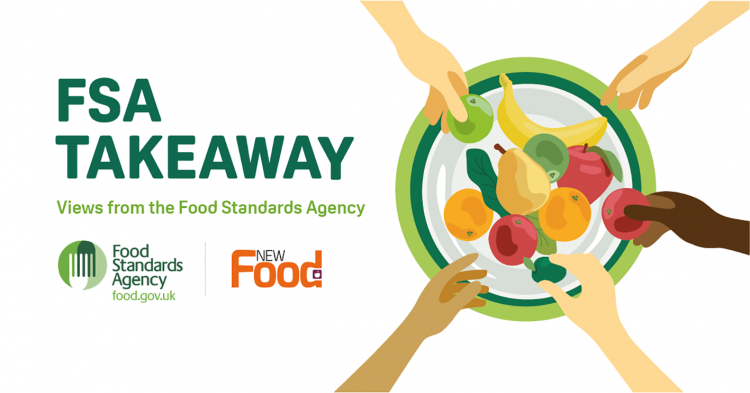We need standardisation on eco-labelling
- Like
- Digg
- Del
- Tumblr
- VKontakte
- Buffer
- Love This
- Odnoklassniki
- Meneame
- Blogger
- Amazon
- Yahoo Mail
- Gmail
- AOL
- Newsvine
- HackerNews
- Evernote
- MySpace
- Mail.ru
- Viadeo
- Line
- Comments
- Yummly
- SMS
- Viber
- Telegram
- Subscribe
- Skype
- Facebook Messenger
- Kakao
- LiveJournal
- Yammer
- Edgar
- Fintel
- Mix
- Instapaper
- Copy Link
Posted: 12 November 2021 | Professor Robin May | No comments yet
Professor Robin May discusses the advantages of eco-labelling in the drive for a more sustainable food system, but calls for a standardised approach to avoid consumer confusion.


As part of COP26, world leaders have gathered in Glasgow, Scotland over the last couple of weeks to discuss a raft of strategies to tackle climate change. As food is responsible for 26 percent of greenhouse gas emissions globally, you would hope this featured high up on the agenda.
The way we grow, process and transport food needs to change, but reducing the impact it currently has on the planet will require dramatic changes in agriculture, manufacturing and transport. The food we buy is driven by a complex interplay between consumer demand, retail marketing and farm production, but who is responsible for driving change when it comes to sustainability?
Where does the responsibility lie?
At present, there are no internationally agreed standards for environmental sustainability labelling and no agreement on what ‘sustainable production’ should measure: carbon dioxide release, water use, biodiversity impact, etc. Consequently, there is no easy way for consumers to make evidence-based purchasing decisions about the environmental impact of their diet.
Our ‘Healthy and Sustainable Diets’ survey has shown that 48 percent of people feel the responsibility for improving the environmental impact/sustainability of UK diets sits with the Government, and equally, 48 percent of those surveyed believe that those involved in food production or manufacturing also have a part to play.
Change is already underway; in the UK, three quarters of us rate sustainability as having a ‘fairly’ or ‘very’ important influence on the food we buy, with 40 percent of people claiming that they have changed, or attempted to change, their diet for environmental reasons since the onset of the COVID-19 pandemic.
However, transforming the food system into one that is fully sustainable relies on a central premise – that the environmental footprint of foods is known. If this was known, we could implement regulated eco-labelling of foods, enabling consumers to compare the environmental footprint of different products and vote with their wallets.
The benefits and challenges of eco-labelling
Eco-labelling would be a powerful driver of change in the food industry. Experience has already shown that mandatory nutritional labelling has helped incentivise companies to reformulate foods, bringing health benefits that go far beyond individual changes in consumer purchasing. Eco-labelling could achieve the same for environmental credentials and drive rapid improvements in food sustainability.
However, with no alignment on how we measure sustainability and so much information out there, how do consumers know where to place their trust? To set the food system on a path to sustainability, we need to urgently tackle this information vacuum. Doing so will require an unprecedented level of collaboration between business, academia and government, but comparable climate-driven collaborations are already underway in sectors such as transport and energy – there is no reason that food should be any different.
Standardisation on eco-labels is needed
With many large food businesses already developing their own in-house sustainability labelling schemes, there is an even greater need for consistency. Without this, we face misinformation and confusion.
If we act swiftly and decisively to create an overarching system underpinned by transparent, auditable metrics, we will be able to set the food system on the fast track to sustainability. Consumer choice would be enhanced, businesses incentivised to ensure sustainable production systems, and food manufacturing encouraged to invest in innovative, carbon-neutral technologies.
Creating such a system will not be easy though, but there are valuable lessons that can be ‘recycled’ from schemes such as nutritional labelling, or even inspiration take from non-food sectors like energy performance certification in housing.
The key underpinning principles must be trust and transparency. Dishonest labelling undermines confidence in the entire food system, so it is essential that sustainability labelling is not only accurate but also easily verifiable by both regulators and consumers. Particular challenges surround detection of mislabelling, since a ‘sustainable’ Braeburn apple looks identical to a non-sustainable one on the supermarket shelf. However, advances in biochemical analysis (for example, detecting isotope patterns that are specific for certain regions or indicative of specific fertiliser use) are likely to catch up quickly as eco-labelling is rolled out.
Such labelling must also be consistent across the sector. Comparing ‘three green stars out of five’ at retailer x with ‘140 carbon miles’ at retailer y will spread confusion and risks jeopardising the entire concept.
Developing a single system will require close coordination between businesses, an enhanced assurance capability for regulators, and expert input from behavioural science to be sure that the end product is clearly and accurately understood by consumers. There is a golden opportunity now for businesses to work together and with the public sector to ‘get on the front foot’, creating a coherent voluntary scheme that can be easily morphed into a mandatory one in due course.
No easy feat, but certainly possible
The complexity of the food system is daunting, and collating the data required for accurate sustainability labelling will not be trivial. In many cases, key data already exist but need to be brought together. For example, farmers and importers already know how much fuel they use to harvest or transport a crop. In other cases, we will need science and technology solutions to obtain new data, such as drone-based imaging to estimate carbon capture, or automatic gas analysis to monitor methane release by livestock. These technologies already exist but are not a typical part of the farmer or food manufacturer’s arsenal of equipment.
In some cases, new research is going to be needed: we have accurate data already on the carbon footprint of a UK dairy cow or a Danish pig, but far less about small-scale coffee plantations or organic tree nut harvesting, for example. This is particularly true of new and emerging sustainable food types; comparing the sustainability credentials of Californian almond ‘milk’ with Devon dairy milk, or a lab-grown burger with a traditional beef burger can only be done if both food types have a comprehensive data set attached to them.
There are also tough, pragmatic decisions to be taken about where to stop and start. Most people would agree that the sustainability footprint of a cheese, for example, should reflect the footprint of the cow that produced the milk, but what about the fertiliser that was used on the grass that the cow ate, or the transport footprint of the staff at the dairy?
And how should a sustainability labelling system incorporate factors that fluctuate over time? A pizza topping made in Cambridge might have a tiny footprint in the summer, using locally-produced, field-grown tomatoes, but a far larger one in the winter when the tomatoes come from heated greenhouses in The Netherlands. Should the label be updated on a batch-by-batch basis?
Climate change is a global problem and needs global solutions. The UK is a recognised leader in food standards and has correspondingly high levels of consumer trust in the food system. This gives us the opportunity to lead the way in making food more sustainable too, but we must act now if we are to do so. None of the problems in the food system are insurmountable, but time is not on our side.
About the author
Professor Robin May is the Food Standards Agency’s Chief Scientific Adviser, who took up the role in July 2020. He also continues to be a Professor of Infectious Disease at the University of Birmingham. As the FSA’s Chief Scientific Adviser, Professor May provides expert scientific advice to the UK government and plays a critical role in helping to understand how scientific developments will shape the work of the FSA.
Related topics
Environment, Labelling, Packaging & Labelling, Regulation & Legislation, retail, Supermarket, The consumer









